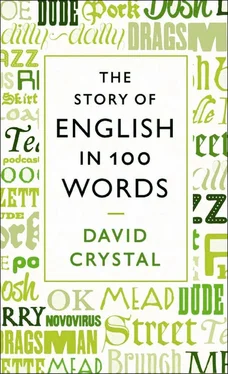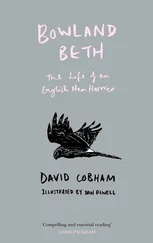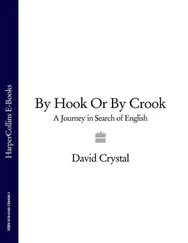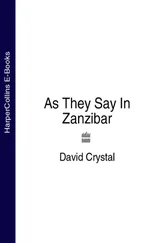David Crystal
THE STORY OF ENGLISH IN 100 WORDS
How can we tell the story of the English language? There seem to be two main ways. The usual approach is to provide an overview, identifying general themes and trends within the major periods of development: Old English … Middle English … Early Modern English … Modern English. Authors give as many examples of usage within each period as space allows. It’s a method I’ve often used myself, in such books as The Stories of English . Its strength, to apply an old metaphor, is that readers obtain a clear view of the wood; its weakness is that they see very few of the trees.
The opposite approach can be seen in the many popular wordbooks that present a series of interesting English words and phrases. One book on my shelves explores the origins of words in personal names, such as sandwich and frisbee . Another explores the origins of interesting idioms, such as it’s raining cats and dogs . I’ve used this method too, such as in my collection of international proverbs, As They Say in Zanzibar . Now we have the opposite strength and weakness: readers see lots of trees but do not obtain an overall picture of the wood.
The present book brings together these two perspectives. It is a wordbook, as its chapter headings illustrate, but one with a difference. Every word has been selected because it tells us something about the way the English language developed. And in the course of exploring each one, I move from the particular to the general, relating the word to important themes and trends in the language as a whole. A sense of linguistic history is reinforced by the ordering of the chapters, which is broadly chronological. And the approach has its surprises. Words such as and and what are not usually included in wordbooks, but they too have a story to tell.
It is, of course, a personal list. If you had to choose 100 words to represent the English language, they would certainly be different. These are mine.
A short history of English words
The Anglo-Saxon monk Bede, writing in his monastery in Northumbria in about the year 730, gives us an early account of those who first spoke the English language. In his Ecclesiastical History of the English Nation , written in Latin, he tells us that the island ‘contains five nations, the English, Britons, Scots, Picts and Latins, each in its own peculiar dialect cultivating the sublime study of Divine truth’. And he goes on to explain how this situation came about.
The first arrivals, Bede says, were Britons (we would now call them Celts), and they gave their name to the land. The Picts then arrived in the north, from Scythia via northern Ireland. The Scots arrived some time later, and secured their own settlements in the Pictish regions. Then, ‘in the year of Rome 798’ (= 43 AD), Emperor Claudius sent an expedition which rapidly established a Roman presence in the island.
The Romans ruled in Britain until the early 5th century, when Rome was taken by the Goths and military garrisons were withdrawn. Attacks on the Britons by the Picts and Scots followed. The Britons appealed to Rome for help, but the Romans, preoccupied with their own wars, could do little. The attacks continued, so the Britons came to a decision. As Bede recounts:
They consulted what was to be done, and where they should seek assistance to prevent or repel the cruel and frequent incursions of the northern nations; and they all agreed with their King Vortigern to call over to their aid, from the parts beyond the sea, the Saxon nation… Then the nation of the Angles, or Saxons, being invited by the aforesaid king, arrived in Britain with three long ships.
The Anglo-Saxon Chronicle reports their landing in Ebbsfleet (Pegwell Bay, near Ramsgate, Kent) in 449 AD. And within 250 years, it would seem from the earliest records, the language we now know as Old English (sometimes called Anglo-Saxon) achieved its distinctive character.
English vocabulary
Vocabulary is always a primary index of a language’s identity, simply because there is so much of it. Anyone who has tried to learn a foreign language knows that the pronunciation and basic grammar can be acquired relatively quickly, but the task of word-learning seems to have no end. Vocabulary is indeed the Everest of language. And it is a mountain that has to be scaled if fluency is to be attained.
In the case of English, the task has been made more complex by the range and diversity of its vocabulary — a reflection of the colourful political and cultural history of the English-speaking peoples over the centuries. To change the metaphor: English is a vacuum-cleaner of a language, whose users suck in words from other languages whenever they encounter them. And because of the way English has travelled the world, courtesy of its soldiers, sailors, traders and civil servants, several hundred languages have contributed to its lexical character. Some 80 per cent of English vocabulary is not Germanic at all.
English is also a playful and innovative language, whose speakers love to use their imaginations in creating new vocabulary, and who are prepared to depart from tradition when coining words. Not all languages are like this. Some are characterised by speakers who try to stick rigidly to a single cultural tradition, resisting loanwords and trying to preserve a perceived notion of purity in their vocabulary (as with French and Icelandic). English speakers, for the most part, are quite the opposite. They delight in bending and breaking the rules when it comes to word creation. Shakespeare was one of the finest word-benders, showing everyone how to be daring in the use of words.
So a wordbook about English is going to display, more than anything else, diversity and individuality. There are few generalisations that apply to the whole of its lexicon. Rather, to see how English vocabulary evolved, we must distinguish the various strands which have given the language its presentday character.
Germanic origins
We begin with the Germanic origins of the language, which can be seen in the early inscriptions that used a form of the runic alphabet widespread in northern Europe. Runes are found on monuments, weapons, ornaments and many other objects, including some very unusual ones ( 1 roe). The Germanic character of English is also visible in the place-names of ancient Britain ( 2 lea), and in the ‘little’ words that show grammatical relationships ( 5 out, 10 what). By the 7th century, we find the earliest surviving manuscripts in Old English, first in the form of glosses and then in texts of continuous prose, several displaying distinctive scribal abbreviations ( 3 and). However, the actual name of the language is not recorded until the 10th century ( 13 English).
Loanwords
English has never been a purely Germanic language. On the mainland of Europe, the Germanic languages had already incorporated words from Latin, and these arrived in Britain with the Anglo-Saxons. Latin then continued to be an important influence, introducing everyday words to do with plants and animals, food and drink, buildings, household objects and many other domains ( 6 street). This vocabulary continued to expand, with the growing influence of missionary activity reflected in an increase in words to do with religion and learning. Old English also contains a few Celtic words ( 12 brock) — not many, but enough to remind us of the earlier inhabitants of the island.
Scandinavia provided another source of words in the Anglo-Saxon period, but only after a considerable passing of time. The Vikings made their presence felt in Britain in the 780s, attacking the south coast and then the monasteries in the north. Conflict continued for a century, until the Treaty of Wedmore, around the year 880, between King Alfred and the Danish leader Guthrum, established an area of eastern England which, because it was subject to Danish laws, came to be known as the Danelaw. A few Old Norse words are found in Old English writings, but the vast majority are not seen until the 13th century. The earliest Middle English literature shows hundreds of Norse words in use ( 20 skirt, 22 take away).
Читать дальше












